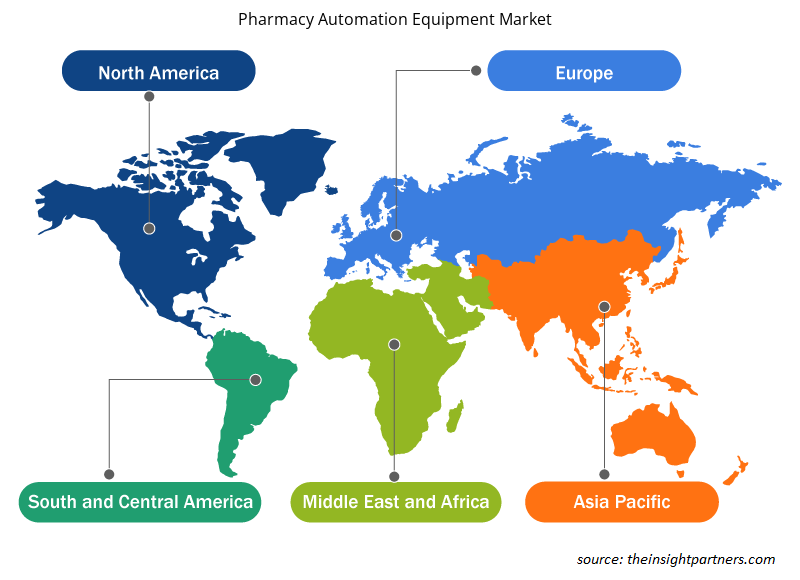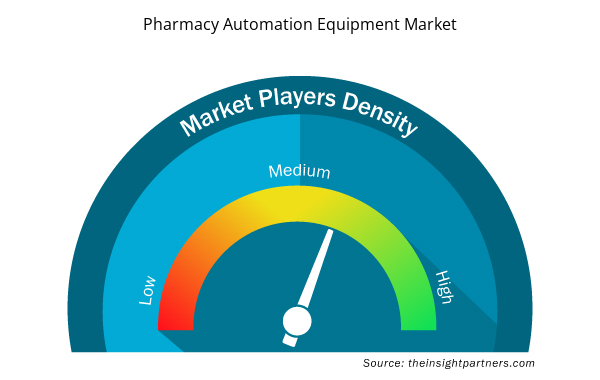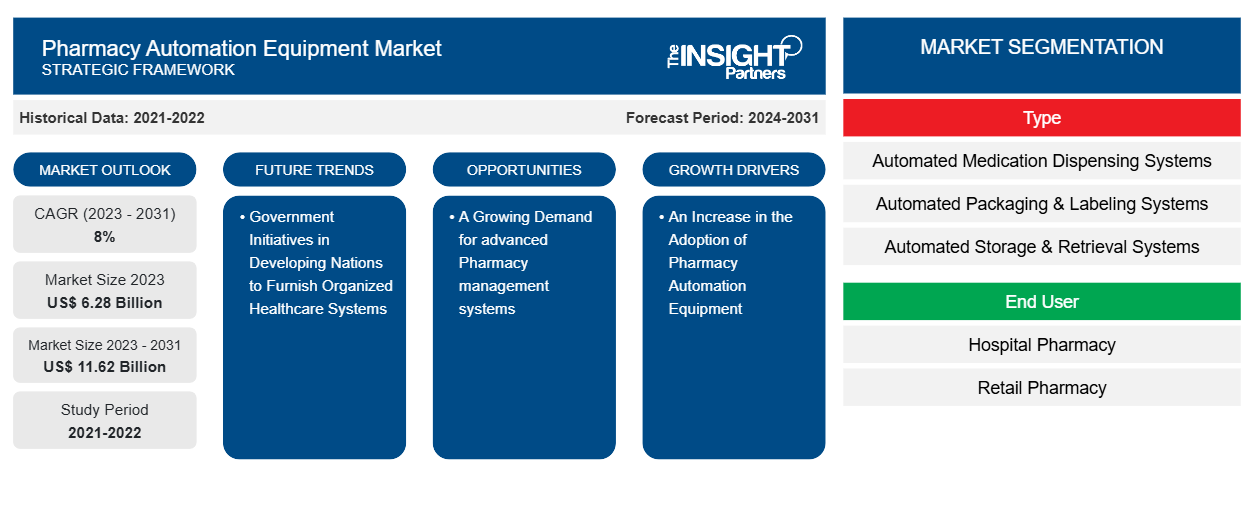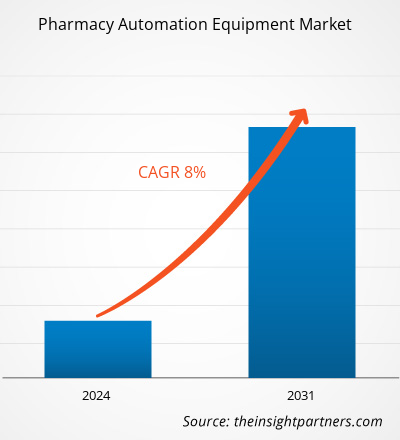薬局自動化機器市場規模は、2023年の62億8,000万米ドルから2031年には116億2,000万米ドルに達すると予測されています。市場は2023年から2031年の間に8.00%のCAGRを記録すると予想されています。投薬システム、ロボット工学、人工知能(AI)、遠隔薬局、自動在庫管理システムの出現は、市場の主要なトレンドであり続けると思われます。
薬局自動化機器市場分析
新しいテクノロジーのおかげで、ヘルスケア分野は絶えず変化し、改善されています。特に薬局ではそれが顕著です。適時性、精度、正確性を維持するために、薬局はさまざまなシステムを使用する必要があるため、この分野の人々はテクノロジーの進歩に遅れを取らないようにする必要があります。患者とヘルスケア提供者の利益のためのテクノロジー革命を先導してきたのは、薬局の自動化です。自動化により、薬剤師は患者の処方箋をより効率的に処理し、より生産的に働くことができるようになりました。自動化により、面倒な作業から健康情報のスムーズな交換まで、あらゆることを処理できます。
薬局自動化機器市場の概要
薬局自動化システムの市場は、薬局に提供する数多くの利点によって牽引されています。自動化により、正確性、薬局のワークフロー、患者体験が向上すると同時に、経費と投薬関連のミスが減少します。世界の自動化市場の将来予測では、処方箋の需要、技術機器、技術知識の拡大が飛躍的に増加すると予想されています。デジタルヘルスケアの分野は急速に成長し、主流となっています。処方箋の数は人口の高齢化とともに増加するため、自動化は将来的に薬局業務に大きな影響を与えることになります。自動化は現在、自動化されたラベル付け、包装、保管、調剤を組み合わせて、調剤ミスを減らし、薬局リーダーの生産性を高めています。この時点から、同社は成長のために電子機器と技術のみを使用します。
要件に合わせてレポートをカスタマイズする
このレポートの一部、国レベルの分析、Excelデータパックなど、あらゆるレポートを無料でカスタマイズできます。また、スタートアップや大学向けのお得なオファーや割引もご利用いただけます。
- このレポートの主要な市場動向を入手してください。この無料サンプルには、市場動向から見積もりや予測に至るまでのデータ分析が含まれます。
薬局自動化機器市場の推進要因と機会
薬局自動化機器の導入増加が市場の成長を後押し
薬局の自動化は現在、ロボットと AI によって行われています。薬局ロボットと呼ばれる機械装置は、プログラムされると、オペレーターの継続的な支援なしに人間の行動を再現できます。たとえば、多くの自動化されたワークフロー システム、薬局のバーコード、および投薬システムはすべてロボットに分類されます。人工知能 (AI) は、多剤併用療法、投薬形態の設計、創薬、コンピューター プログラム、および病院薬局などのさまざまなタスクに適用できる、薬局技術の急速に発展している分野です。AI は通常、人間の認知タスクを模倣するために使用されるため、製薬業界ではこの技術の使用が大幅に増加する可能性があります。AI は、デジタル コンピューターまたはコンピューター制御のロボット (自動調剤キャビネットなど) で人間のようなタスクを実行するために使用できます。大手製薬会社は、研究開発、創薬、ヘルスケア システム分析、投薬精度、医療サポート、および支援、反復タスク、治療計画の設計、および健康記録の維持に人工知能 (AI) を使用し始めています。 AI は、バーコード スキャン、自動薬剤調製、自動追跡、調剤など、病院薬局でさまざまな目的で使用できます。したがって、薬局自動化システムの新しいアプリケーションと相まって使用の増加が市場の成長を促進する可能性があります。
発展途上国における政府の取り組み
医療費が上昇し、サービスへのアクセスを改善する圧力が高まっているため、医薬品管理は発展途上国で重要な役割を果たしています。たとえば、薬剤師の役割は、適切なカウンセリング、モニタリング、服薬遵守の確保、およびウイルスに悩まされている多くのリソースが限られた環境でのHIV薬剤耐性の発現の防止を含むように拡大しています。これにより、最先端の技術的ソリューションの必要性が生じます。発展途上国の政府は、これらの医薬品を入手しやすくするためにいくつかの対策を実施しています。たとえば、HIV治療の提供を改善するために、ナミビアの保健社会サービス省は、抗レトロウイルス療法の拡大を可能にするために、数か月間の調剤を実施しました。ナミビアの医療施設では現在、これが広く使用されており、国のHIV治療目標の達成に役立っています。インドでは、病院部門が医療市場全体の80%を占めています。国内外の投資家からの需要が非常に高くなっています。したがって、予測期間中、これらの要因は、薬局自動化機器市場に大きな成長機会を生み出す可能性があります。
薬局自動化機器市場レポートのセグメンテーション分析
薬局自動化機器市場分析の導出に貢献した主要なセグメントは、タイプとエンドユーザーです。
- タイプ別に見ると、薬局自動化機器市場は、自動投薬システム、自動包装・ラベル貼付システム、自動保管・検索システム、自動調剤装置、卓上錠剤カウンターに分かれています。自動投薬システムセグメントは、2023年に最大の市場シェアを占めました。
- エンドユーザー別に見ると、市場は病院薬局、小売薬局、その他に分類されます。病院薬局セグメントは2023年に市場で最大のシェアを占めました。
薬局自動化機器の地域別市場シェア分析
薬局自動化機器市場レポートの地理的範囲は、主に北米、アジア太平洋、ヨーロッパ、中東およびアフリカ、南米および中米の 5 つの地域に分かれています。
北米は世界市場で最大のシェアを獲得しており、その成長は米国における薬局自動化機器の採用増加、公衆衛生意識の高まり、政府の取り組みの増加、大手企業の存在などの要因によって推進されています。市場成長の主な原動力は、投薬ミスの増加と医薬品の需要増加です。米国の患者数の増加は、毎日複数の薬を服用する患者数の増加を示しています。調査によると、米国では患者の50%以上が少なくとも1つの処方箋を持っており、その多くが毎日複数の薬を服用しているため、投薬ミスや潜在的な健康リスクのリスクが高まっています。医薬品の需要の高まり、技術の進歩、タスクを効率的に実行するための精密なロボット機器とツールの必要性が、市場成長の重要な要因になると予想されます。
薬局自動化機器市場の地域別洞察
予測期間を通じて薬局自動化機器市場に影響を与える地域的な傾向と要因は、Insight Partners のアナリストによって徹底的に説明されています。このセクションでは、北米、ヨーロッパ、アジア太平洋、中東、アフリカ、南米、中米にわたる薬局自動化機器市場のセグメントと地理についても説明します。

- 薬局自動化機器市場の地域別データを入手
薬局自動化機器市場レポートの範囲
| レポート属性 | 詳細 |
|---|---|
| 2023年の市場規模 | 62億8千万米ドル |
| 2031年までの市場規模 | 116.2億米ドル |
| 世界のCAGR(2023年~2031年) | 8% |
| 履歴データ | 2021-2022 |
| 予測期間 | 2024-2031 |
| 対象セグメント | タイプ別
|
| 対象地域と国 | 北米
|
| 市場リーダーと主要企業プロフィール |
|
薬局自動化機器市場のプレーヤー密度:ビジネスダイナミクスへの影響を理解する
薬局自動化機器市場は、消費者の嗜好の変化、技術の進歩、製品の利点に対する認識の高まりなどの要因により、エンドユーザーの需要が高まり、急速に成長しています。需要が高まるにつれて、企業は提供を拡大し、消費者のニーズを満たすために革新し、新たなトレンドを活用し、市場の成長をさらに促進しています。
市場プレーヤー密度とは、特定の市場または業界内で活動している企業または会社の分布を指します。これは、特定の市場スペースに、その規模または総市場価値と比較して、どれだけの競合相手 (市場プレーヤー) が存在するかを示します。
薬局自動化機器市場で事業を展開している主要企業は次のとおりです。
- セルナーコーポレーション
- アメリソースバーゲン
- バクスターインターナショナル株式会社
- Talyst LLC (スイスログヘルスケア)
- カプサヘルスケア
- BD
免責事項:上記の企業は、特定の順序でランク付けされていません。

- 薬局自動化機器市場のトップキープレーヤーの概要を入手
薬局自動化機器市場のニュースと最近の動向
薬局自動化機器市場は、主要な企業出版物、協会データ、データベースなどの一次調査と二次調査後の定性的および定量的データを収集することによって評価されます。薬局自動化機器市場の動向のいくつかを以下に示します。
- 世界有数の医療技術企業であるBD(ベクトン・ディッキンソン・アンド・カンパニー)と、ヘルスケア分野に特化した大手プライベートエクイティファームであるフレイジャー・ヘルスケア・パートナーズは、薬局自動化ソリューションの革新的なプロバイダーであるパラタ・システムズをBDが15億2,500万ドルで買収することで正式契約を締結したことを発表しました。(出典:BD、プレスリリース、2022年6月)
- 病院、小売、長期ケア市場にサービスを提供するカナダの薬局は、薬剤管理の信頼性、効率、安全性を高める次世代の薬局自動化技術を利用できるようになりました。これには、服薬遵守パウチ包装および検査システムや、フロントローディング式半自動バイアル充填機が含まれます。(出典: ニュースレター、2024 年 4 月)
薬局自動化機器市場レポートの対象範囲と成果物
「薬局自動化機器市場規模と予測(2021〜2031年)」レポートでは、以下の分野をカバーする市場の詳細な分析を提供しています。
- 薬局自動化機器市場の規模と予測は、対象範囲に含まれるすべての主要市場セグメントについて、世界、地域、国レベルで示されています。
- 薬局自動化機器市場の動向、および推進要因、制約、主要な機会などの市場動向
- 詳細なPEST/ポーターの5つの力とSWOT分析
- 主要な市場動向、世界および地域の枠組み、主要プレーヤー、規制、最近の市場動向を網羅した薬局自動化機器市場分析。
- 市場集中、ヒートマップ分析、主要プレーヤー、薬局自動化機器市場の最近の動向を網羅した業界の状況と競争分析
- 詳細な企業プロフィール
- 過去2年間の分析、基準年、CAGRによる予測(7年間)
- PEST分析とSWOT分析
- 市場規模価値/数量 - 世界、地域、国
- 業界と競争環境
- Excel データセット



Report Coverage
Revenue forecast, Company Analysis, Industry landscape, Growth factors, and Trends

Segment Covered
This text is related
to segments covered.

Regional Scope
North America, Europe, Asia Pacific, Middle East & Africa, South & Central America

Country Scope
This text is related
to country scope.
よくある質問
North America dominated the pharmacy automation equipment market in 2023
Key factors driving the market are an increase in the adoption of pharmacy automation equipment and a growing demand for pharmacy automation equipment.
The emergence of medication dispensing systems, robotics, artificial intelligence (AI), telepharmacies, and automated inventory management systems are likely to remain a key trend in the market.
Cerner Corporation, AmerisourceBergen, Baxter International Inc, Talyst LLC (Swisslog Healthcare), Capsa Healthcare, BD, OMNICELL INC, MCKESSON CORPORATION, ScriptPro LLC, YUYAMA Co., Ltd
The market is expected to register a CAGR of 8.0% during 2023–2031.
Trends and growth analysis reports related to Life Sciences : READ MORE..
The Insight Partners performs research in 4 major stages: Data Collection & Secondary Research, Primary Research, Data Analysis and Data Triangulation & Final Review.
- Data Collection and Secondary Research:
As a market research and consulting firm operating from a decade, we have published and advised several client across the globe. First step for any study will start with an assessment of currently available data and insights from existing reports. Further, historical and current market information is collected from Investor Presentations, Annual Reports, SEC Filings, etc., and other information related to company’s performance and market positioning are gathered from Paid Databases (Factiva, Hoovers, and Reuters) and various other publications available in public domain.
Several associations trade associates, technical forums, institutes, societies and organization are accessed to gain technical as well as market related insights through their publications such as research papers, blogs and press releases related to the studies are referred to get cues about the market. Further, white papers, journals, magazines, and other news articles published in last 3 years are scrutinized and analyzed to understand the current market trends.
- Primary Research:
The primarily interview analysis comprise of data obtained from industry participants interview and answers to survey questions gathered by in-house primary team.
For primary research, interviews are conducted with industry experts/CEOs/Marketing Managers/VPs/Subject Matter Experts from both demand and supply side to get a 360-degree view of the market. The primary team conducts several interviews based on the complexity of the markets to understand the various market trends and dynamics which makes research more credible and precise.
A typical research interview fulfils the following functions:
- Provides first-hand information on the market size, market trends, growth trends, competitive landscape, and outlook
- Validates and strengthens in-house secondary research findings
- Develops the analysis team’s expertise and market understanding
Primary research involves email interactions and telephone interviews for each market, category, segment, and sub-segment across geographies. The participants who typically take part in such a process include, but are not limited to:
- Industry participants: VPs, business development managers, market intelligence managers and national sales managers
- Outside experts: Valuation experts, research analysts and key opinion leaders specializing in the electronics and semiconductor industry.
Below is the breakup of our primary respondents by company, designation, and region:

Once we receive the confirmation from primary research sources or primary respondents, we finalize the base year market estimation and forecast the data as per the macroeconomic and microeconomic factors assessed during data collection.
- Data Analysis:
Once data is validated through both secondary as well as primary respondents, we finalize the market estimations by hypothesis formulation and factor analysis at regional and country level.
- Macro-Economic Factor Analysis:
We analyse macroeconomic indicators such the gross domestic product (GDP), increase in the demand for goods and services across industries, technological advancement, regional economic growth, governmental policies, the influence of COVID-19, PEST analysis, and other aspects. This analysis aids in setting benchmarks for various nations/regions and approximating market splits. Additionally, the general trend of the aforementioned components aid in determining the market's development possibilities.
- Country Level Data:
Various factors that are especially aligned to the country are taken into account to determine the market size for a certain area and country, including the presence of vendors, such as headquarters and offices, the country's GDP, demand patterns, and industry growth. To comprehend the market dynamics for the nation, a number of growth variables, inhibitors, application areas, and current market trends are researched. The aforementioned elements aid in determining the country's overall market's growth potential.
- Company Profile:
The “Table of Contents” is formulated by listing and analyzing more than 25 - 30 companies operating in the market ecosystem across geographies. However, we profile only 10 companies as a standard practice in our syndicate reports. These 10 companies comprise leading, emerging, and regional players. Nonetheless, our analysis is not restricted to the 10 listed companies, we also analyze other companies present in the market to develop a holistic view and understand the prevailing trends. The “Company Profiles” section in the report covers key facts, business description, products & services, financial information, SWOT analysis, and key developments. The financial information presented is extracted from the annual reports and official documents of the publicly listed companies. Upon collecting the information for the sections of respective companies, we verify them via various primary sources and then compile the data in respective company profiles. The company level information helps us in deriving the base number as well as in forecasting the market size.
- Developing Base Number:
Aggregation of sales statistics (2020-2022) and macro-economic factor, and other secondary and primary research insights are utilized to arrive at base number and related market shares for 2022. The data gaps are identified in this step and relevant market data is analyzed, collected from paid primary interviews or databases. On finalizing the base year market size, forecasts are developed on the basis of macro-economic, industry and market growth factors and company level analysis.
- Data Triangulation and Final Review:
The market findings and base year market size calculations are validated from supply as well as demand side. Demand side validations are based on macro-economic factor analysis and benchmarks for respective regions and countries. In case of supply side validations, revenues of major companies are estimated (in case not available) based on industry benchmark, approximate number of employees, product portfolio, and primary interviews revenues are gathered. Further revenue from target product/service segment is assessed to avoid overshooting of market statistics. In case of heavy deviations between supply and demand side values, all thes steps are repeated to achieve synchronization.
We follow an iterative model, wherein we share our research findings with Subject Matter Experts (SME’s) and Key Opinion Leaders (KOLs) until consensus view of the market is not formulated – this model negates any drastic deviation in the opinions of experts. Only validated and universally acceptable research findings are quoted in our reports.
We have important check points that we use to validate our research findings – which we call – data triangulation, where we validate the information, we generate from secondary sources with primary interviews and then we re-validate with our internal data bases and Subject matter experts. This comprehensive model enables us to deliver high quality, reliable data in shortest possible time.


 このレポートの無料サンプルを入手する
このレポートの無料サンプルを入手する